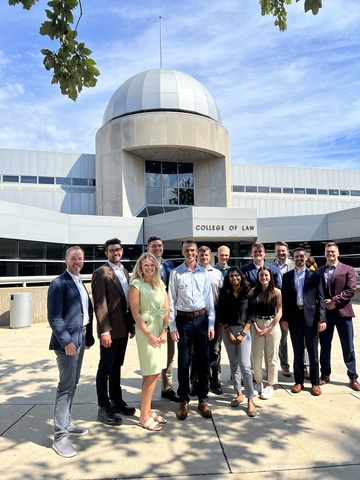“Many students leave law school without learning how to read or write a contract,” expressed LAWR Professor Andrew Crouse who recently introduced the new Contract Drafting Bootcamp, “I wanted to help change that by providing more practical skills training to our law students.”
The College of Law has a longstanding tradition of producing excellent legal writers, and Dean Kevin Washburn has made it a priority to continue to invest in and expand on programming to support the development of this pivotal skill for our graduates. Known as the “Writing Law School,” Iowa Law wants to ensure students graduate with the ability to excel in all aspects of legal writing.
This past year, three new legal writing courses were introduced: Contact Drafting Bootcamp, Advanced Legal Writing, and Judicial Opinion Writing.

Professor Crouse’s Contract Drafting Bootcamp is a week-long course that introduces students to the parts of a contract and the principles of contract drafting through intensive simulation. Contracts are an essential part of the practice of law for both transactional lawyers, who draft contracts, and litigators, who often argue about what contracts mean. In class, students consider the doctrine, theory, skills, and ethics associated with contract drafting, and engage in multiple contract-drafting exercises. Outside of class, students draft a contract from a mock term sheet and meet with the professor during two or more drafting conferences to discuss their work.
“You know contract law but not contract drafting,” stated Professor Crouse, “My goal with the Contract Drafting Bootcamp is to help more law students learn this critical skill. Between our one-hour Contract Drafting Bootcamp and our three-hour Principles of Contract Drafting course, Iowa Law now offers a contract drafting course for just about everyone.”
In addition to the bootcamp, Advanced Legal Writing is a new course available to tutors in the Writing and Academic Success Center. The focus of the course is to give students the tools they need to effectively teach writing to others, mainly focused on predictive, persuasive, and academic writing.
The class evaluates the art and science of giving feedback and discusses the key components of teaching writing to adult learners through oral presentation. As a way of practicing these skills, students deliver content to an audience of adult learners on writing-related topics.
“I am so excited to teach Advanced Legal Writing,” expressed Dawn Anderson, professor of Legal Analysis, Writing and Research. “The class will do two things. First, it will hone the skills of the Writing Center tutors. Besides the skill of legal writing – which is essential for the tutors -- there are many other skills that Writing Center tutors need to deliver feedback effectively to student writers. Tutors must also be good and active listeners, able to prioritize their suggestions, be effective teachers, and be compassionate and understanding. The Writing Center tutors will use these skills in the Writing Center but will also take these important lawyering skills with them when they graduate and serve the public. Second, the course will help us deliver a better product. Our goal in the Writing Center is to deliver compassionate feedback that will improve the students as writers even beyond the project they bring to us.”
The third new course offered at Iowa Law is Judicial Opinion Writing taught by Professor Mary Ksobiech. The course supports the growing number of students entering judicial clerkships after graduation.
“We draft various documents that law clerks are asked to write, such as bench memoranda, draft orders, and even dissenting opinions,” explained Professor Ksobiech, ‘Watching the students sort through the arguments presented to the court and then determine how to express the best resolution of the issues makes it one of my favorite courses to teach.”
Professors Ksobiech, Crouse, and Anderson are three of six full-time Legal Analysis, Writing & Research faculty at Iowa Law. In total the LAWR faculty bring close to 120 years of writing experience between them and are dedicated to advancing the craft of legal writing.
